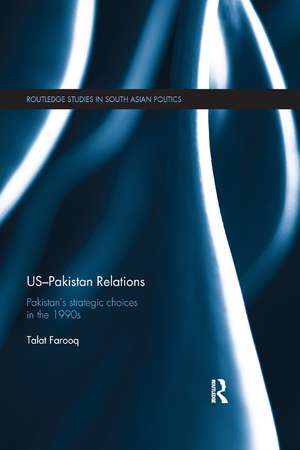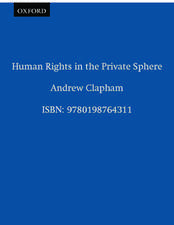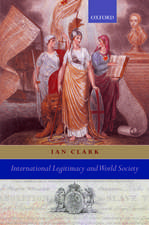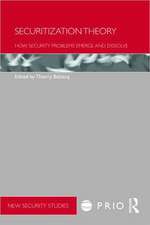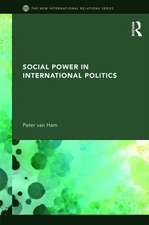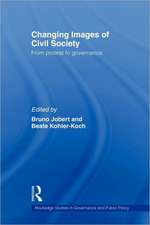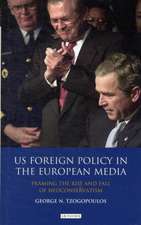US-Pakistan Relations: Pakistan's Strategic Choices in the 1990s: Routledge Studies in South Asian Politics
Autor Talat Farooqen Limba Engleză Paperback – 12 dec 2019
Drawing upon a diverse range of oral history interviews as well as available written sources, the book explains the American contribution to Pakistani security objectives during the presidency of Bill Clinton (1993-2001). The author investigates and explains the dynamics which drove Islamabad’s pursuit of nuclear weapons, its support for the Taliban and its approach towards the indigenous uprising in Indian Kashmir. She argues that Clinton’s foreign policy contributed to the hardening of Islamabad’s security perspectives, creating space for the Pakistani military establishment to pursue its regional security goals. The book also discusses the argument that US-Pakistan relations during this period were driven by a Cold War mindset, causing a fissure between US global and Pakistan’s regional security goals. The Pakistani military and civilian leadership utilized these divergent and convergent trends to protect Islamabad’s India-centric strategic interests.
The book addresses a gap in the relevant literature and moves beyond the available mono-causal explanations often distorted by a mixture of intellectual obfuscation and political rhetoric. It adds a Pakistani perspective and is a valuable contribution to the study of US-Pakistan relations.
| Toate formatele și edițiile | Preț | Express |
|---|---|---|
| Paperback (1) | 382.57 lei 6-8 săpt. | |
| Taylor & Francis – 12 dec 2019 | 382.57 lei 6-8 săpt. | |
| Hardback (1) | 1054.75 lei 6-8 săpt. | |
| Taylor & Francis – 4 iul 2016 | 1054.75 lei 6-8 săpt. |
Din seria Routledge Studies in South Asian Politics
-
 Preț: 281.98 lei
Preț: 281.98 lei -
 Preț: 310.55 lei
Preț: 310.55 lei - 8%
 Preț: 389.71 lei
Preț: 389.71 lei - 18%
 Preț: 260.07 lei
Preț: 260.07 lei -
 Preț: 387.20 lei
Preț: 387.20 lei -
 Preț: 386.39 lei
Preț: 386.39 lei - 20%
 Preț: 259.98 lei
Preț: 259.98 lei -
 Preț: 389.66 lei
Preț: 389.66 lei - 17%
 Preț: 257.28 lei
Preț: 257.28 lei - 18%
 Preț: 1000.27 lei
Preț: 1000.27 lei -
 Preț: 389.38 lei
Preț: 389.38 lei -
 Preț: 436.14 lei
Preț: 436.14 lei - 17%
 Preț: 190.88 lei
Preț: 190.88 lei - 16%
 Preț: 260.33 lei
Preț: 260.33 lei - 19%
 Preț: 256.32 lei
Preț: 256.32 lei -
 Preț: 453.41 lei
Preț: 453.41 lei -
 Preț: 411.42 lei
Preț: 411.42 lei - 26%
 Preț: 764.20 lei
Preț: 764.20 lei -
 Preț: 444.62 lei
Preț: 444.62 lei - 31%
 Preț: 767.07 lei
Preț: 767.07 lei - 19%
 Preț: 258.70 lei
Preț: 258.70 lei - 26%
 Preț: 764.94 lei
Preț: 764.94 lei - 19%
 Preț: 271.82 lei
Preț: 271.82 lei -
 Preț: 386.99 lei
Preț: 386.99 lei - 18%
 Preț: 1000.87 lei
Preț: 1000.87 lei - 18%
 Preț: 998.71 lei
Preț: 998.71 lei -
 Preț: 449.41 lei
Preț: 449.41 lei -
 Preț: 382.65 lei
Preț: 382.65 lei - 12%
 Preț: 299.52 lei
Preț: 299.52 lei - 26%
 Preț: 820.56 lei
Preț: 820.56 lei - 18%
 Preț: 1000.30 lei
Preț: 1000.30 lei - 26%
 Preț: 763.61 lei
Preț: 763.61 lei
Preț: 382.57 lei
Nou
Puncte Express: 574
Preț estimativ în valută:
73.21€ • 76.15$ • 60.44£
73.21€ • 76.15$ • 60.44£
Carte tipărită la comandă
Livrare economică 15-29 aprilie
Preluare comenzi: 021 569.72.76
Specificații
ISBN-13: 9780367874940
ISBN-10: 0367874946
Pagini: 196
Dimensiuni: 156 x 234 x 11 mm
Greutate: 0.29 kg
Ediția:1
Editura: Taylor & Francis
Colecția Routledge
Seria Routledge Studies in South Asian Politics
Locul publicării:Oxford, United Kingdom
ISBN-10: 0367874946
Pagini: 196
Dimensiuni: 156 x 234 x 11 mm
Greutate: 0.29 kg
Ediția:1
Editura: Taylor & Francis
Colecția Routledge
Seria Routledge Studies in South Asian Politics
Locul publicării:Oxford, United Kingdom
Public țintă
PostgraduateCuprins
Introduction
1. The US-Pakistan Cold War Alliance: A Historical Perspective
2. Out in the Cold: Immediate Post-Cold War Catalysts (1989-1993)
3. Clinton’s Foreign Policy and Pakistan: Reinforcing Catalysts
4. Coping Mechanisms: Pakistan’s Response to Clinton’s Foreign Policy
Conclusion
1. The US-Pakistan Cold War Alliance: A Historical Perspective
2. Out in the Cold: Immediate Post-Cold War Catalysts (1989-1993)
3. Clinton’s Foreign Policy and Pakistan: Reinforcing Catalysts
4. Coping Mechanisms: Pakistan’s Response to Clinton’s Foreign Policy
Conclusion
Notă biografică
Talat Farooq is a Research Associate in the Institute of Conflict, Cooperation and Security in the School of Government and Society at the University of Birmingham, UK.
Descriere
This book explains Pakistan’s strategic choices in the 1990s by examining the role of the United States in the shaping of Islamabad’s security goals. Drawing upon a diverse range of oral history interviews as well as available written sources, it explains the American contribution to Pakistani security objectives during the presidency of Bill Cl
